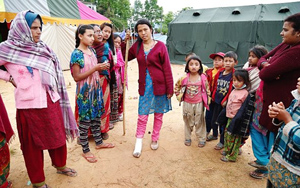New Delhi, May 24: A "massive" spurt in human trafficking instances in the aftermath of the devastating earthquake in Nepal has prompted security agencies to issue an alert along the open Indo-Nepal border.
The Sashastra Seema Bal (SSB), mandated to guard this 1,751-km long frontier and also collect intelligence on suspicious activities, has apprehended about 50 young girls and boys who were allegedly being trafficked along this border after March 25, the day when the strong earthquake hit Nepal and eastern parts of India.
The SSB has caught about 15 suspected traffickers in less than a month's time-- 10 Indians and five Nepalese-- who were making these young boys and girls cross the border illegally, which the security agencies believe could be for a variety of purposes like indulging in flesh trade, forced labour, beggary and illegal working as domestic helps among others.
They suspect that some of them may be victims of the quake and local police of these areas are carrying out investigation in these cases.
"We are witnessing a massive spurt in trafficking incidents along the Nepal border post the quake. The numbers have drastically shot up. Our units, especially along areas where Bihar and Uttar Pradesh touch the border, are apprehending an increasing number of young boys and girls from both identified crossing routes and illegal tracts.
"We have asked all our border units to be on alert and keep a special eye on suspicious movement from both sides," SSB Director General B D Sharma told media.
What has worried the agencies more is that two young Uzbeki girls were detained from an "illegal" border crossing area near Bihar's Raxaul yesterday, as till now youngsters of either Indian or Nepalese nationality were being nabbed.
Confirming that the vigil has been heightened further after the apprehension of the Uzbekistan women, the DG said SSB commanders on field have been asked to increase patrols and mount additional surveillance.
"We had apprehensions that human trafficking incidents could go up in the border areas post the earthquake and that has come true with these numbers," he said.
Keeping in mind this exigency, SSB formations, immediately after the quake, were asked to conduct some special training modules for troops to effectively check trafficking.
"Our sectors in Ranikhet, Lucknow, Patna, Siliguri and Guwahati have already got in touch with anti-trafficking NGOs on both the sides to clamp down on the menace," Sharma said.
A report prepared in this regard reveals that a large number of alleged trafficking victims were apprehended by SSB personnel along Raxaul and Jogbani in Bihar, Rupaidiha and Mahrajganj in Uttar Pradesh and Jhulaghat in Uttarakhand.
Among those apprehended by the force, 48 are boys and 14 females who are in the age group of 10-20 years of age.
The two Uzbeki women held yesterday are in the age group of 23-25 years, a senior SSB official said.
"All of these have been handed over to local police who have registered cases and are probing," the official said.
The report reveals that trafficking incidents started to rise from around May 2, about a week after the quake.





Comments
Add new comment